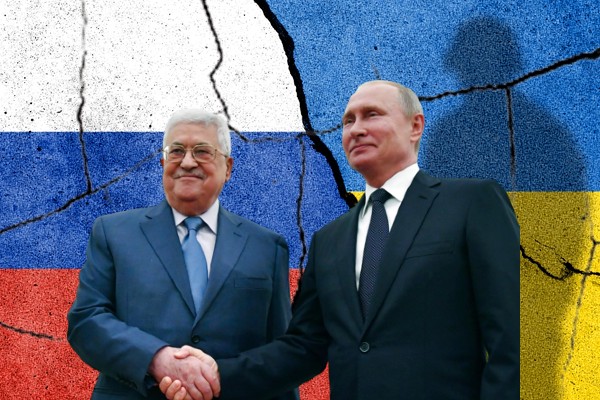The Russia-Ukraine crisis has tremendous implications for the Palestinians, but their leaders are still on the fence.
By Pesach Benson, United With Israel
While the world’s preoccupied with the war in Ukraine, Palestinian leaders have been uncharacteristically silent. Neither the PA nor Hamas are in a position to take sides.
The war is hundreds of miles away, yet they are deeply worried for a number of reasons.
The Palestinians are diplomatically sidelined.
When nothing else is going on in the world, the Israeli-Palestinian conflict always seems to get international attention. But the Palestinians have a hard time being out of the spotlight when the everyone is fixated on bigger things.
For years, the conventional wisdom was that once Israel and the Palestinians made peace, many of the region’s problems would fall into place. That thinking gave the Palestinians enormous leverage — they held the key to Israel’s normalization of ties with the Arab world.
But the Mideast — and certainly not the world — do not revolve around the Israel-Palestinian conflict.
The Abraham accords took flight without the Palestinians. The COVID pandemic isn’t inherently Palestinian. And neither is the war in Ukraine.
Israel’s international stature is rising.
Thanks to the Abraham accords and the common threat posed by Iran, Arab countries are engaging with Israel.
Russian President Vladimir Putin appears to grudgingly respect Israel’s self-reliance. Israel continues striking Iranian targets in Syria, even though Russia rules its skies. That respect is why Prime Minister Naftali Bennett visited Moscow on Saturday to help mediate the war.
His visit was coordinated with Ukraine, the U.S., Germany and France.
Bennett acknowledges that the chances of success aren’t promising, but he insists that Israel has a moral obligation to try.
Countries are also taking note of Israeli humanitarian aid for Ukrainian refugees, including a virtual hospital that uses telemedicine techniques allowing doctors in Tel Aviv to diagnose and treat people.
While COVID sidelined the Palestinians, Israel was at the forefront of medical research thanks to its electronic health care system and an arrangement to receive early shipments of Pfizer’s vaccine.
Abbas was banking on Moscow to deliver Israel.
Abbas has always sought to internationalize the Mideast peace talks by getting Russia and Europe more involved. His hope? An international peace conference with Russian participation as a counterweight to what Palestinians regard as American bias towards Israel.
Moscow’s diplomatic isolation will dash whatever faint hopes Abbas might have left for that approach.
The Palestinian Authority is too risk-averse to choose a side.
While Bennett was criticized for not taking a stronger stance against the Russian invasion, he claimed he wanted to leave Israel room to possibly mediate. And in the end, Israel joined another 140 countries in the UN General Assembly condemning the invasion.
The Palestinians, by virtue of their observer status, did not have a vote and have not been forced to choose a side.
Palestinian activists on social media are trying to make common cause with Ukraine, claiming that both are occupied by brutal regimes and that the sanctions being applied to Russia should also be applied to Israel. But that’s not a message Abbas would dare voice for fear of Moscow’s response.
Jewish refugees will come to Israel.
The war hasn’t triggered a mass exodus of Ukrainian Jews, but that could change.
The Palestinians don’t like waves of aliyah. They hope that through a natural birth rate and the return of their “refugees,” Palestinians will demographically outnumber the Jews between the Jordan River and the Mediterranean.
Ukrainian olim will need to stay somewhere, and it’s a lock that the PA will complain if refugees are sent to Israeli settlements in Judea and Samaria.
The war’s economic ripples will hurt a vulnerable Palestinian economy.
The UN Relief and Works Agency (UNRWA) which supports the Palestinians, is strapped for cash. Foreign aid has steadily declined since 2013. According to Axios, foreign aid covered only $129 million of the PA’s budget. The PA is the largest employer in Judea and Samaria, yet employees have only been paid 70-80 percent of their salaries in 2021.
Axios added that the PA’s debts to local banks amounts to a staggering $2.37 billion.
Since the Russian invasion, the price of fuel and wheat has risen, and the economic news is bound to get worse.
Donors are already supporting the fight against COVID and now the Palestinians are competing with Ukraine for assistance.
Palestinians are jarred to see sanctions on Russia instead of Israel.
The Palestinians have been screaming for boycotts, divestment and sanctions against Israel, to limited effect.
Now, the world is applying BDS to Russia on a scale the Palestinians could only dream of. It has to bother the BDS movement, which for 20 years never sought to target real human rights abusers in places like China, Sudan, North Korea, Cuba or Russia.
But if there’s one glimmer of hope that the Palestinians can hold on to, the sanctions on Russia could be a precedent and rallying cry in the event of a future Gaza war.
